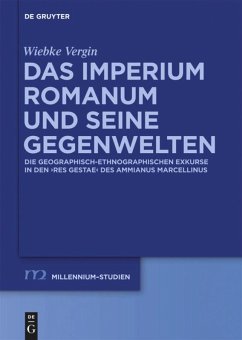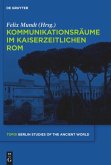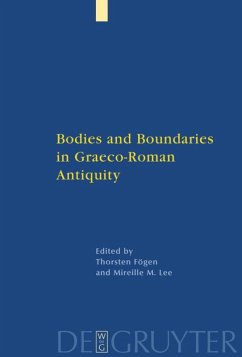Ammianus is regarded as the greatest historian of late antiquity. Yet his geographic and ethnographic digressions were long underestimated as examples offeigned eruditionand as undue interruptions to the historical narrative. The author of this volume believes that the key to understanding Ammianusâ??s work as a whole lies in his teaching of classical rhetoric, his metaphoric reading of landscapes, and the creation of spaces for memory and counterworlds to the Imperium Romanum. In this way, historical understanding and digressions concerning geographic knowledge must be viewed as interdependent features of the text. The author thus casts a new light on Ammianusâ??s literary achievements.
Ammian gilt als der größte Historiker der Spätantike. Doch seine geographisch-ethnographischen Exkurse über Gallien, Ägypten, Persien und über nomadische Fremdvölker wie Sarazenen, Alanen und Hunnen wurden lange als imitierte Gelehrsamkeit und überflüssige Unterbrechung des Geschichtsverlaufs unterschätzt. In den klassischen Lehren der Rhetorik, der metaphorischen Lesung der Landschaften, der Konstituierung von Erinnerungsräumen und Gegenwelten zum Imperium Romanum deckt die Autorin den Schlüssel für das Verständnis des Gesamtwerks auf: Geschichtsverständnis und Diskurse über geographisches Wissen bedingen einander. Dadurch erscheint auch Ammians schriftstellerische Leistung in einem neuen Licht. So gewinnt der Leser einerseits eine Fülle von gesichertem Forschungswissen über die unbekannten 'Ränder der antiken Welt' und nimmt andererseits die Exkurse nicht länger als schmückendes Beiwerk der Haupthandlung wahr, sondern als sinnkonstituierende Partien innerhalb dieser.
Ammian gilt als der größte Historiker der Spätantike. Doch seine geographisch-ethnographischen Exkurse über Gallien, Ägypten, Persien und über nomadische Fremdvölker wie Sarazenen, Alanen und Hunnen wurden lange als imitierte Gelehrsamkeit und überflüssige Unterbrechung des Geschichtsverlaufs unterschätzt. In den klassischen Lehren der Rhetorik, der metaphorischen Lesung der Landschaften, der Konstituierung von Erinnerungsräumen und Gegenwelten zum Imperium Romanum deckt die Autorin den Schlüssel für das Verständnis des Gesamtwerks auf: Geschichtsverständnis und Diskurse über geographisches Wissen bedingen einander. Dadurch erscheint auch Ammians schriftstellerische Leistung in einem neuen Licht. So gewinnt der Leser einerseits eine Fülle von gesichertem Forschungswissen über die unbekannten 'Ränder der antiken Welt' und nimmt andererseits die Exkurse nicht länger als schmückendes Beiwerk der Haupthandlung wahr, sondern als sinnkonstituierende Partien innerhalb dieser.
"One would wish that Vergin had been more critical of her own interpretations and had stayed closer to Ammianus' text, because her book contains a lot of valuable information about an essential aspect of his work and is a welcome addition to the fast growing scholarly literature on Ammianus."
Daan den Hengst in: Sehepunkte 13,9/2013
"Insgesamt aber weist V. einen Weg, der in überzeugender Weise die Funktion der Exkurse für die innere Einheit der Res gestae herausstellt und so die historiographische Qualität dieses Werkes unterstreicht."
Ulrich Lambrecht in: Gymnasium 120,4/2013
"V. hat ein Buch vorgelegt, das sich flott liest und gut aufgebaut ist. Wer sich vertiefen will in die geographisch-ethnographischen Exkurse Ammians findet interessante Gesichtspunkte, obwohl der Leser sich manchmal fragen wird, ob dieVerf. nicht zu viel hineininterpretiert."
Hans Carel Teitler in: Gnomon 87/2015
Daan den Hengst in: Sehepunkte 13,9/2013
"Insgesamt aber weist V. einen Weg, der in überzeugender Weise die Funktion der Exkurse für die innere Einheit der Res gestae herausstellt und so die historiographische Qualität dieses Werkes unterstreicht."
Ulrich Lambrecht in: Gymnasium 120,4/2013
"V. hat ein Buch vorgelegt, das sich flott liest und gut aufgebaut ist. Wer sich vertiefen will in die geographisch-ethnographischen Exkurse Ammians findet interessante Gesichtspunkte, obwohl der Leser sich manchmal fragen wird, ob dieVerf. nicht zu viel hineininterpretiert."
Hans Carel Teitler in: Gnomon 87/2015








